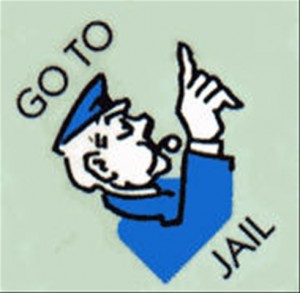The answer is no. You are not going to go to jail because you can’t pay your debts. In ages past if you couldn’t pay your debts you would be put in debtor’s prison, however the U.S. government abolished debtor’s prisons in 1833.
Some unscrupulous debt collection agencies will threaten that you will be arrested for not paying them the money they are seeking. If this happens to you it is a good idea to speak with a consumer attorney to see if the Fair Debt Collection Practices Act (“FDCPA”) has been violated. They cannot threaten you with penalties that are not available under the law. There are additional protections under the FDCPA when it comes to collection agencies. The Arizona Foundation for Legal Services and Education has provided a good compilation of behaviors that are prohibited under the FDCPA:
- They must not call you at a time or place they know or should know to be inconvenient for you. Unless you tell them otherwise, they must call you between 8:00 a.m. and 9:00 p.m. at your local time.
- If they know you have a lawyer representing you regarding the debt they are collecting, they must contact your lawyer and not contact you directly.
- They must not call you at work if they know or have reason to know that your employer does not allow this. If you are called at work, tell the collector, or have your boss tell them, they must not call you at work again. Then, if they do, simply refuse to speak to them. Also, keep a record of calls made by a collector after they have been told not to call at work.
- They must not communicate with you by postcard.
Further, they cannot make false statements to get you to pay a debt. Specifically, they cannot:
- Falsely stating the amount, type or legal status of a debt.
- Falsely stating an amount owed for the collector’s services in collecting from you, or trying to get you to pay for collect calls and telegrams.
- Falsely stating or suggesting that they are a lawyer or are represented by a lawyer.
- Stating or suggesting that you can be arrested for not paying a debt, or that you have committed a crime, or saying anything intended to state that you are or will be publicly disgraced.
- Stating that legal action, such as a lawsuit, will be taken against you, when they really do not intend to do so, or falsely telling you that real lawsuit papers are not really a lawsuit and don’t require any action by you.
- Stating or suggesting that they will seize your wages or property unless the law allows that and the creditor actually intends to do so.
- Threatening to do anything that is not legal or which they do not really intend to do.
- Providing or threatening to provide false information about you to anyone, including a credit bureau, including the failure to communicate that the debt is disputed.
- Using any written materials which falsely appear to be issued or approved by a court or governmental entity, or which in any way create a false impression of the source, authorization and approval of the written materials.
- Using a false name or falsely claiming that they own, operate or work for a credit bureau.
If you belief a collection agency has violated the FDCPA, give my office a call at (480) 420-4208 or via email at john@skibalaw.com .
Schedule a Free Consultation!
 John Skiba, Esq.
John Skiba, Esq.
We offer a free consultation to discuss your debt problem and help you put together a game plan to eliminate your debt once and for all. Give us a call at (480) 420-4028

